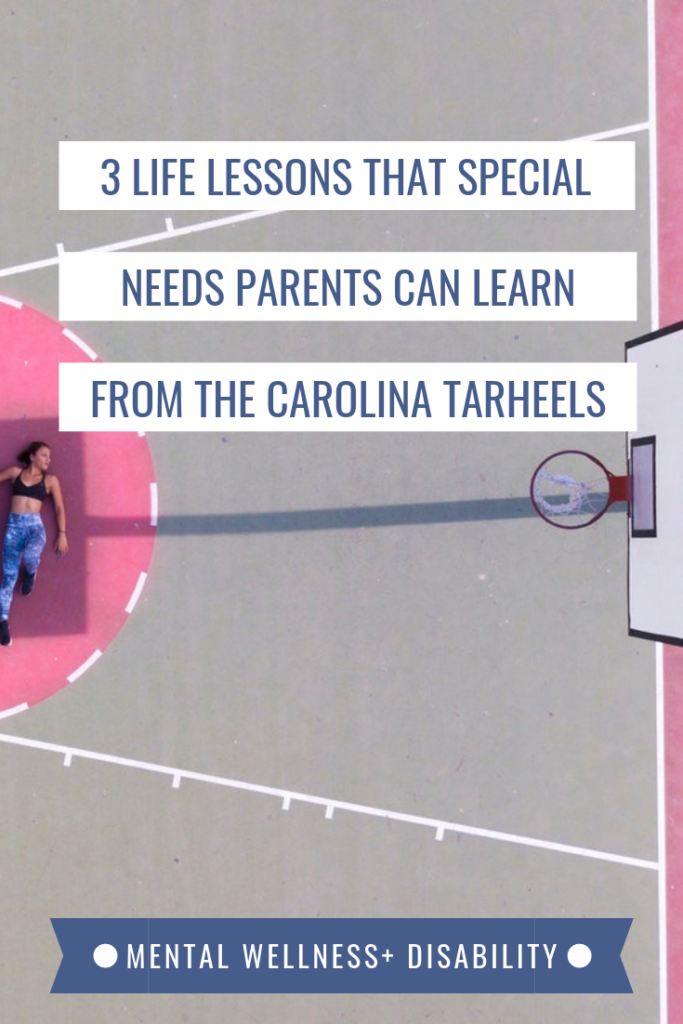I’m neither a Tarheel born nor a Tarheel bred. But to say that I am a fan of Carolina Tarheel basketball would be an understatement.
I earned both my undergraduate and graduate degrees from UNC-Chapel Hill. I’ve sat in more than one class where a professor used a basketball play to illustrate their point. Carolina professors, it seems, can make basketball a metaphor for nearly everything. In 2005 (another Championship year for the Heels), I sat in a Cognition and Neuropsychiatry seminar listening to lecturer explain neurotransmission across the synaptic cleft. He described it as akin to Raymond Felton getting the ball to Sean May.
Now, in 2017, I again watched my team earn the NCAA National Championship title. As I did, I saw some life lessons exemplified by the Tarheels’ game changing play in the last 7 seconds of their Elite 8 match up against the Kentucky Wildcats. Life lessons that I worry many special needs parents have missed. I don’t know if I can spin good basketball into a metaphor for special needs parenting. But I’ll give it a shot (see what I did there?).

What happened on the court
With less than 10 seconds to go on the clock, it didn’t look great for the Heels. Kentucky had just tied it up at 70 by hitting a 3 pointer, and overtime seemed unavoidable. Carolina Forward Theo Pinson brought the ball down the court and drew the defense to him as he crossed the paint. Just when it seemed he’d over calculated the shot he was hoping to take, he turned his sights from the basket and moved the ball to Sophomore Luke Maye. Maye effortlessly floated the ball to the basket, scoring the Heels a game winning 2 points and moving them on to the Final Four.
What it means for special needs parents
Have a plan and stick to it, even when things are stressful
The Carolina Tarheels’ head coach is Roy Williams. He won’t call a timeout if they are taking the ball in with less than 7 seconds on the clock.. He’s defended his timeout philosophy a time or two over the years. Whether he should or shouldn’t be calling timeout isn’t what’s important here. The point is that his team know that this is his philosophy. They know they can trust him to stick to it. The Tarheel players knew they’d need to make something work without the benefit of extra time to communicate or plan.
As special needs parents, you spend so much time planning, identifying goals, evaluating outcomes, advocating, writing, researching…Yes, there’s a time and place for all that communication. But there’s also a time to trust the plans that you have made and to execute them. Discomfort and intensity are natural and expected emotions that you will experience at critical times.
The difficult sensations don’t mean that something isn’t working, or that your plans need to change.
It just means that what you’re up against is legitimately tough.
I see this often during counseling with clients who are raising kids with special needs. I discuss it with clients at the start of treatment, that they very likely may feel worse before they feel better, and that this is a normal part of the therapeutic process. Yet it’s usually still understandably difficult for them when it happens to them. Sometimes the discomfort is too intense, and they leave therapy. This is one of the most difficult parts of being a therapist. The knowing that if a client will stay present through the difficult times, and continue to have hope that they can beat whatever is getting them down, they will usually find whatever it is they came looking for. Accepting that sometimes they just aren’t ready for it.
You never know where your strongest support will come from
Luke Maye, the star shooter who forever clinched his Carolina legacy with those game-winning two points, was not heavily recruited by Tarheel scouts who knew he had it in him. He didn’t come to Carolina on an athletic scholarship.
Luke Maye was a walk on.
He showed up for a try out, showed the coaching staff what he could do, and earned himself a spot on the team.
Never underestimate someone who shows up with enthusiasm for helping your child be their best. Even if their education or experience isn’t what you’d expect, it doesn’t mean they aren’t just the person you need on your team.
Most importantly, do you know when to pass the ball, and do you know who will be open to accepting it?
The goal of basketball is to get the ball in the basket. Sometimes one member of the team realizes, like Theo Pinson realized, that they are not the person best equipped to put the ball in the basket. When this happens, they have a fraction of a second to make a choice. They can continue to drive and try to be the one to make the shot. Or, they can look for someone open, someone in a better position to make the shot for the benefit of the team achieving their goal.
The goal of raising a child is to raise a person who is healthy, happy, and as self-sufficient as possible. This is true no matter what your child’s developmental needs are. Parents of kids with disabilities know that they cannot always continue to be the one pushing things forward. They know that they won’t always have the energy or the strength to carry everyone. Many parents put on blinders and continue to drive toward the basket. They are convinced that they are doing what’s best for their child by continuing to try to make shot after shot. Other parent recognize that they will not always be on the court, and that they would be wiser to start looking for someone to pass the ball to. Someone they can trust to keep moving toward the goal, even when the lineup changes.
If you know someone who might appreciate my silly sports analogies, please use the share buttons to spread the word!












